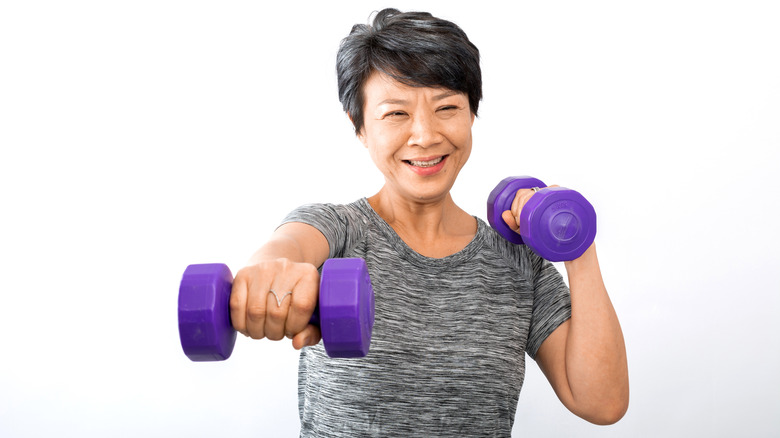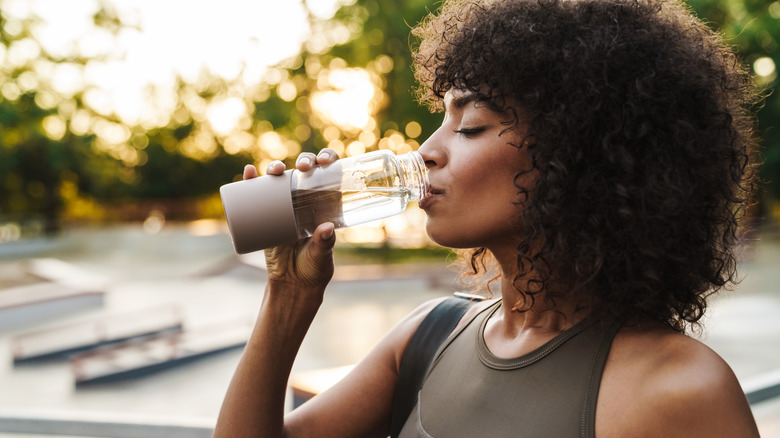What Is Your Metabolic Age And How Can You Improve It?
If you could make yourself younger, would you? While it's impossible to change your chronological age, there is an age you may be able to change: your metabolic age. This is a number based on your metabolic rate when your body is at rest, says MBGHealth. Metabolism is a term used to describe the chemical processes within your body as the food you eat is converted into energy, according to Cleveland Clinic.
Dr. Heather Moday told MBGHealth that to find your current metabolic age, you first need your basal metabolic rate (BMR). Your BMR is determined by the amount of caloric energy your body needs to continue to function and maintain your muscles, organs, and digestion when you are in a resting state. There are many factors that contribute to your BMR, including weight, height, gender, and lean muscle mass. Your doctor can calculate your BMR or you can also use an online calculator like the one at Inch Calculator.
Catherine J. Andersen, Ph.D., RDN, told Livestrong there's no standardized, validated way to calculate your metabolic age. You can see a medical or fitness expert who has the technology to measure it. There are also bioelectrical impedance scales for home use. Or, if you have a metabolic age chart that shows the BMR of other people your age, you can compare yourself with that.
If you're disheartened after you learn your metabolic age, don't fret. There are several lifestyle changes you can make to improve it.
Movement is metabolic magic
One of the best ways to change your BMR and metabolic age is to become physically active (via MBGHealth). Burning calories while you're active has a waterfall effect when it comes to the amount of calories you burn while you're at rest.
One form of exercise that can improve your metabolic age is weight lifting. During strength training, the act of building muscle mass can lower your metabolic age and improve BMR.
Weight training shouldn't be restricted to younger gym-goers since maintaining muscle mass and strength are vital as we age. You don't have to be a professional bodybuilder to increase muscle mass either. Begin by doing exercises with a light set of weights and then slowly progress. You can even use cartons of milk or other items you have around the house to easily incorporate strength training into your daily routine.
Research also shows that high-intensity interval training (HIIT) workouts, which include periods of high-intensity exercise alternated with periods of recovery, may be an effective way to improve your metabolic health. According to a 2021 article in the European Journal of Applied Physiology, HIIT promotes positive changes in body composition as well as cardiometabolic health.
The American College of Sports Medicine notes that the high-intensity intervals of your workout should feel like you are working hard. However, the recovery periods in between should be done at a comfortable pace to help you gear up for the next high-intensity interval.
Resting and refueling are important too
Rest is as important as physical activity when it comes to improving your metabolic health, reports Healthline. Maintaining a solid balance of physical activity during the day and quality sleep at night will improve both your BMR and metabolic age. This is especially true given that a lack of sleep has been linked to higher rates of obesity and increased risk of diabetes. The best part is that these two activities boost one another, with exercise helping you sleep better at night and a better night's rest giving you more energy to exercise during the day. That's a win-win!
Between sleeping and workouts, prioritize a diet that's nutritious and low in processed items. When you eat, your metabolism can temporarily speed up, so eating foods high in protein and fiber that give your body sustainable and longer-lasting energy will improve your metabolic age.
Another item that can increase your metabolism? Good ol' water! And replacing sugary beverages with water can decrease overall caloric intake. If you don't want to stick with water all day, try oolong or green tea, which have been found to increase metabolism and contribute to weight loss.
However, the positive benefits of healthy lifestyles can be undone by chronic stress, advises MBGHealth. Utilize your support network and resources to decrease the stress that can lower your BMR.



